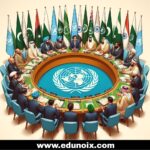Pakistan’s Foreign Policy: Objectives, Challenges, and Future Prospects
Table of Contents
- Introduction
- Definition of Pakistan’s Foreign Policy
- Aims and Objectives of Pakistan’s Foreign Policy
- 3.1 Safeguarding National Security
- 3.2 Economic Growth and Trade Expansion
- 3.3 Strengthening Diplomatic Relations
- 3.4 Supporting Peace and Stability
- 3.5 Promoting Muslim Unity
- 3.6 Protecting the Interests of Overseas Pakistanis
- Determinants of Pakistan’s Foreign Policy
- 4.1 Internal Determinants
- 4.2 External Determinants
- Challenges Facing Pakistan’s Foreign Policy
- 5.1 The Kashmir Dispute and India-Pakistan Relations
- 5.2 Afghanistan’s Political Instability
- 5.3 Balancing U.S.-Pakistan Relations
- 5.4 Economic Dependencies and IMF Bailouts
- 5.5 Global Perception and Counterterrorism Efforts
- Pakistan’s Foreign Policy: Ideology-Based or National Interest-Based?
- Recommendations for an Effective Foreign Policy
- 7.1 Strengthening Regional Diplomacy
- 7.2 Economic Diversification and Self-Reliance
- 7.3 Improving Global Reputation
- 7.4 Balancing Global Alliances
- (Conclusion )
- Frequently Asked Questions and it’s answers
Introduction
Foreign policy is the strategic framework that defines a nation’s interactions with the rest of the world. It encompasses diplomatic, economic, and security-related decisions aimed at protecting national interests while fostering international cooperation. Pakistan’s foreign policy has evolved over the years, influenced by historical experiences, regional dynamics, and global geopolitical shifts. As a strategically located South Asian country, Pakistan plays a pivotal role in international politics, balancing its relations with major global and regional powers while safeguarding its sovereignty and economic growth.
Since gaining independence in 1947, Pakistan has pursued a foreign policy that aligns with its national security priorities, economic interests, and ideological commitments. The country’s geopolitical position, bordering China, India, Afghanistan, and Iran, adds complexity to its diplomatic engagements. This article provides an in-depth analysis of Pakistan’s foreign policy, examining its objectives, determinants, challenges, and future prospects.
Definition of Pakistan’s Foreign Policy
Foreign policy is a set of principles and strategies that guide a country’s relations with other states. It is shaped by national interests, economic priorities, and international obligations. A well-defined foreign policy helps a nation secure its place in the global community while ensuring internal stability.
For Pakistan, foreign policy revolves around key pillars such as national security, economic growth, and regional peace. The country has consistently sought to establish strong diplomatic ties with neighboring states and major world powers while playing an active role in global organizations such as the United Nations (UN), the Organization of Islamic Cooperation (OIC), and the South Asian Association for Regional Cooperation (SAARC).
Pakistan’s foreign policy has undergone various transformations, shifting from an ideology-driven approach to a more pragmatic and interest-based strategy. While Islamic identity has historically played a role in shaping diplomatic relations, contemporary foreign policy emphasizes economic cooperation, trade partnerships, and regional security.
Aims and Objectives of Pakistan’s Foreign Policy
The primary objectives of Pakistan’s foreign policy include:
1. Safeguarding National Security
One of the foremost objectives of Pakistan’s foreign policy is to ensure national security by protecting its sovereignty and territorial integrity. Given its historical conflicts with India and the ongoing Kashmir dispute, security remains a central concern. Pakistan maintains strong defense ties with countries like China, Turkey, and Saudi Arabia while actively engaging in global counterterrorism efforts.
2. Economic Growth and Trade Expansion
Economic diplomacy is a key pillar of Pakistan’s foreign policy. The country aims to foster trade relations, attract foreign investments, and integrate into regional and global economic frameworks. Projects like the China-Pakistan Economic Corridor (CPEC) highlight Pakistan’s focus on infrastructure development and economic connectivity. Strengthening trade ties with Gulf countries, Europe, and Southeast Asia remains a priority.
3. Strengthening Diplomatic Relations
Pakistan seeks to maintain friendly relations with global and regional powers, including the United States, China, Russia, and the Middle Eastern nations. Diplomatic engagements are focused on securing economic partnerships, defense cooperation, and political support in international forums.
4. Supporting Peace and Stability
As a member of the United Nations, Pakistan actively participates in global peacekeeping missions. The country advocates for peaceful conflict resolution, particularly in regions affected by instability, such as Afghanistan and the Middle East. Its foreign policy emphasizes the importance of dialogue and negotiation over military confrontation.
5. Promoting Muslim Unity
Pakistan has historically played an active role in promoting unity among Muslim nations. The country supports the rights of Muslims in Palestine, Kashmir, and other conflict zones. It has been a key participant in OIC summits and has consistently called for collective action to address challenges facing the Muslim world.
6. Protecting the Interests of Overseas Pakistanis
With a large diaspora contributing to the national economy through remittances, Pakistan’s foreign policy includes measures to protect the rights and interests of overseas Pakistanis. Strengthening labor agreements, ensuring legal protections, and fostering diplomatic ties with host countries are essential components of this objective.
Determinants of Pakistan’s Foreign Policy
Pakistan’s foreign policy is influenced by a combination of internal and external factors:
Internal Determinants
- Geopolitical Location – Pakistan’s strategic position at the crossroads of South Asia, Central Asia, and the Middle East makes it a key player in regional politics. Its proximity to China and its historical rivalry with India significantly impact its foreign relations.
- Economic Needs – Pakistan’s foreign policy decisions are often shaped by economic imperatives, including trade agreements, foreign investments, and financial aid from global institutions like the International Monetary Fund (IMF).
- Political Stability – A stable political environment strengthens a country’s diplomatic standing. Domestic governance, democratic institutions, and military influence all play roles in shaping foreign policy.
External Determinants
- Regional Conflicts – Tensions with India over Kashmir, instability in Afghanistan, and relations with Iran influence Pakistan’s foreign policy decisions.
- Global Power Alliances – Relations with the U.S., China, Russia, and the European Union impact Pakistan’s strategic decisions on defense, trade, and security.
- International Organizations – Pakistan’s commitments to the UN, OIC, SAARC, and other global bodies shape its diplomatic engagements and policy priorities.
Challenges Facing Pakistan’s Foreign Policy
1. The Kashmir Dispute and India-Pakistan Relations
The long-standing conflict over Kashmir remains a major foreign policy challenge for Pakistan. Diplomatic efforts to resolve the issue have faced obstacles, with India maintaining a hardline stance on the region. The revocation of Article 370 by India in 2019 further escalated tensions, making conflict resolution more difficult.
2. Afghanistan’s Political Instability
Pakistan’s relationship with Afghanistan has been complex, marked by security concerns and cross-border militancy. The withdrawal of U.S. forces and the Taliban’s resurgence present new challenges for Pakistan, particularly regarding border security and regional stability.
3. Balancing U.S.-Pakistan Relations
Pakistan’s ties with the United States have fluctuated over the years. While both countries have cooperated on counterterrorism efforts, issues like drone strikes, financial aid conditions, and strategic partnerships with India have strained relations.
4. Economic Dependencies and IMF Bailouts
Pakistan’s reliance on international financial institutions limits its economic sovereignty. Structural challenges such as trade deficits, inflation, and debt servicing impact foreign policy decisions.
5. Global Perception and Counterterrorism Efforts
Pakistan has faced criticism regarding its counterterrorism policies. Efforts to combat extremism and improve its global image remain crucial for securing international partnerships and economic investments.
Recommendations for an Effective Foreign Policy
1. Strengthening Regional Diplomacy
- Engage in continuous diplomatic efforts to resolve the Kashmir dispute peacefully.
- Enhance economic and security cooperation with Afghanistan.
- Improve trade relations with neighboring countries to boost regional stability.
2. Economic Diversification and Self-Reliance
- Reduce dependence on foreign loans by strengthening domestic industries.
- Expand trade agreements with European and Southeast Asian markets.
3. Improving Global Reputation
- Actively participate in peacekeeping missions and humanitarian initiatives.
- Promote Pakistan’s contributions in technology, education, and cultural diplomacy.
4. Balancing Global Alliances
- Maintain neutrality in global power struggles while fostering strong bilateral relations.
- Strengthen defense and energy partnerships with Russia and China.
Conclusion
Pakistan’s foreign policy is a dynamic and evolving framework that balances security concerns, economic aspirations, and diplomatic engagements. While challenges persist, there are significant opportunities for Pakistan to enhance its global standing by adopting a balanced and pragmatic approach. A strong, flexible, and well-executed foreign policy will ensure Pakistan’s long-term prosperity and its rightful place in the international community.
Frequently Asked Questions (FAQs) on Pakistan’s Foreign Policy
Question 1. What is the main objective of Pakistan’s foreign policy?
Answer: The main objective of Pakistan’s foreign policy is to safeguard national security, promote economic stability, foster diplomatic relations, and contribute to global peace while protecting the country’s sovereignty and territorial integrity.
Question 2. How does Pakistan handle its relations with India?
Answer: Pakistan advocates for peaceful resolution of disputes with India, particularly the Kashmir issue, through diplomatic channels and international mediation. However, ongoing border tensions and political differences continue to pose challenges to bilateral relations.
Question 3. Why is China important in Pakistan’s foreign policy?
Answer: China is Pakistan’s largest economic and strategic partner, with projects like the China-Pakistan Economic Corridor (CPEC) boosting infrastructure and trade. The strong defense ties between the two nations also contribute to regional stability.
Question 4. How does Pakistan balance its relations with the U.S. and China?
Answer: Pakistan seeks a neutral stance by maintaining strategic partnerships with both the U.S. and China. While the U.S. is an important ally in counterterrorism and global diplomacy, China plays a vital role in Pakistan’s economic and infrastructure development.
Question 5. What role does Pakistan play in the Muslim world?
Answer: Pakistan actively supports Muslim unity and is a founding member of the Organization of Islamic Cooperation (OIC). It advocates for the rights of Muslims in Palestine, Kashmir, and other conflict zones while fostering diplomatic ties with Gulf countries and other Muslim-majority nations.
Question 6. How does Pakistan contribute to global peace?
Answer: Pakistan is one of the largest contributors to United Nations peacekeeping missions. The country plays a key role in international conflict resolution, humanitarian efforts, and counterterrorism initiatives.
Question 7. What are the biggest challenges facing Pakistan’s foreign policy?
Answer: Some of the major challenges include:
- The unresolved Kashmir dispute with India.
- Political instability in Afghanistan affecting regional security.
- Balancing relations between global powers like the U.S. and China.
- Economic dependencies on foreign aid and IMF loans.
- Addressing concerns regarding counterterrorism policies and global perception.
Question 8. How does Pakistan ensure the protection of overseas Pakistanis?
Answer: Pakistan’s foreign policy includes agreements with various countries to protect the rights of overseas Pakistanis. The government engages in diplomatic efforts to safeguard labor rights, improve working conditions, and provide legal assistance to Pakistani expatriates.
Question 9. How does Pakistan handle economic diplomacy?
Answer : Pakistan focuses on trade expansion, foreign direct investment (FDI), and infrastructure development through economic diplomacy. Agreements like CPEC with China and trade partnerships with Gulf countries and the European Union play a crucial role in economic growth.
Question 10. What measures can Pakistan take to strengthen its foreign policy?
Answer: To improve its foreign policy, Pakistan should:
- Enhance regional trade and cooperation.
- Diversify its economic partnerships to reduce reliance on financial aid.
- Improve global perception through active participation in international forums.
- Strengthen internal governance to present a stable image to the world.
- Adopt a balanced


